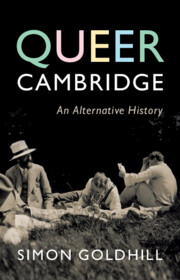
- Publisher:
- Cambridge University Press
- Online publication date:
- January 2025
- Print publication year:
- 2025
- Online ISBN:
- 9781009528078

Queer Cambridge recounts the untold story of a gay community living, for many decades, at the very heart of the British Establishment. Making effective use of chiefly forgotten archival sources – including personal diaries and letters – the author reveals a network that was in equal parts tolerant and acerbic, and within which the queer Fellows of Cambridge University explored bold new forms of camaraderie and relationship. Goldhill examines too the huge influence that these individuals had on British culture, in its arts, politics, music, theatre and self-understanding. During difficult decades when homosexuality was unlawful, gay academics – who included celebrated literary and scientific figures like E. M. Forster, M. R. James, Rupert Brooke and Alan Turing – lived, loved, and grew old together, bringing new generations into their midst. Their remarkable stories add up not just to an alternative history of male homosexuality in Britain, but to an alternative history of Cambridge itself.
‘Queer Cambridge succeeds on a number of fronts. It is a fascinating analysis of a remarkably coherent group identity and its transmission across generations. It is a revelatory work of institutional history, delivering rich insight both into one institution in particular and into how institutions in general work to create and solidify identity and values. And it is a book that says new and unusual things about the place of same-sex desire at the heart of the Victorian and Edwardian English cultural' establishment. I agree with pretty much every word of Queer Cambridge, and learned something new and surprising on every page.
Darryl Jones - Professor of Modern British Literature and Culture, Trinity College Dublin
‘Unique in its examination of a multi-generational queer community, Queer Cambridge expertly maps the interpersonal relationships between a wide range of individuals and displays the range of behaviors present within this community. Goldhill demonstrates how same-sex desire long preceded the development of the modern category of ‘the homosexual' and fleshes out influential individuals such as Lytton Strachey and John Maynard Keynes in ways not achieved elsewhere.'
Charles Upchurch - Professor of British History, Florida State University
‘In this exciting, authoritative, gossipy, giddy book, sleuthing homosexualist Simon Goldhill charts the sprawling topography of same-sex desire contained in little more than a few square yards. An indispensable microhistory of Cambridge and the networks of queer men that thrived within the walls of its most famous college – from flamboyant Oscar Browning to the devastating Rupert Brooke; tortured Arthur Benson to the flirtatious Dadie Rylands - Queer Cambridge shows how vital a sense of place is to queer intimacy, community, and identity, and how indispensable its study is to any history of sexuality.'
Diarmuid Hester - Research Associate in English, Emmanuel College and author of Nothing Ever Just Disappears: Seven Hidden Histories
‘This powerful, moving and hugely enjoyable slice of homosexual history, meticulously researched and written with sympathy, wit and elegance, recreates a queer college community and its evolution from the nineteenth century to the present. In a story shaded with nuance, Goldhill presents a judicious assessment of the evidence: letters, diaries, college records, anecdotes, legends, paintings, photographs, biographies, confessions. He opens up this closed college world of secrets like an oyster, filled with pearls and brine.'
Patricia Duncker - author of Hallucinating Foucault
'There are few more interesting writers on sex and relationships than Simon Goldhill. Through a fascinating picture of the transformations of a community of gay men from the nineteenth century to today, Queer Cambridge offers provocative reflections on how we write queer history and how we think about identity and belonging. It is also a love letter to a college and university that he knows so well.’
Helen Morales - Argyropoulos Professor of Hellenic Studies, University of California, Santa Barbara
 Loading metrics...
Loading metrics...
* Views captured on Cambridge Core between #date#. This data will be updated every 24 hours.
Usage data cannot currently be displayed.